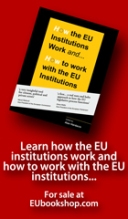While the recent Basle agreement requires banks to carry a slightly higher cash cushion, nothing has been done to re-establish the division between investment banking and commercial high-street banking. Except for a temporary ban on naked short sales in Germany, the derivatives trade remains mainly unregulated. Honorary Professorial Research Fellow in London, George Irvin, makes the picture crystal clear.
“How long will sensible people go on accepting this nonsense before venting their anger on our ruling classes?”
George Irvin

“It may sound like total madness, but that’s pretty well what’s happening to a growing number of Europeans (including Brits) today,” George Irvin writes in his latest blog post.
I don’t think anyone could tell the story of the European Great Resession better and more understandable than professor George Irvin does in his latest blog post at the EUobserver.com:
*
Suppose that my rich neighbour down the road mortgaged his mansion up to the hilt to bet on the horses, ran up millions in debt and asked me, an ordinary punter, to pay off his debts plus interest.
Suppose that foolishly I accepted, and while I struggled to pay it off while barely able to feed my family and pay off the mortgage, my super-rich neighbour acquired an even bigger mansion.
To make matters worse, he used all sorts of clever dodges in the Caymans to pay negligible taxes, while if I failed to pay mine I knew I’d be sent to prison.
It may sound like total madness, but that’s pretty well what’s happening to a growing number of Europeans (including Brits) today.
How did we get here? In Britain, the 2008 credit crunch produced a massive recession which played havoc with government finances.
In Ireland the government took over the entire debt of its banking system, while in Greece, the rich paid minimal taxes and successive governments, unwilling to challenge them, indulged in creative accounting.
That’s somewhat simplified, but it’s the essence of the story.
Everywhere in Europe, voters are being told that decent pensions and universal welfare provision are no longer affordable and that we must all tighten our belts.
Governments can no longer borrow because the credit rating agencies might downgrade their bonds.
First it was Greece and Ireland, today it is Portugal, and tomorrow perhaps Spain, then Italy, and then … who knows?
But ordinary punters are starting to wake up.
Instead of enduring years of economic depression, the Greeks and the Irish will probably have to default, as will the Portuguese if their economy reacts the same way to belt-tightening.
And what if Spain has to be bailed out, still less defaults?
That would spell a major hit for banks in Germany, France, the UK (and elsewhere), all of which could easily add up to another major financial crisis.
Are we really so vulnerable?
The answer is indeed yes – because so little has been done to address the underlying causes of the 2008 crisis.
While the recent Basle Three agreement requires banks to carry a slightly higher cash cushion, nothing has been done to re-establish the division between investment banking and commercial high-street banking, a division which disappeared with the repeal in the US of Glass–Steagall in 1999.
Except for a temporary ban on naked short sales in Germany, the derivatives trade remains mainly unregulated.
Credit default swaps (a form of insurance on risky financial products) are still sold over-the-counter rather than through an official market, the US President having failed to follow up his 2009 promise to re-regulate these.
Meanwhile, the trillions poured into the big banks since 2008, instead of going to cash-starved small business or being used to build infrastructure and to create jobs, have largely helped fuel a new stock market bubble.
The extraordinary rise in the value of companies such as Facebook and Zynga provides a worrying parallel with the dotcom bubble of 2000.
Tax dodging is now a major growth industry—witness the latest GE scandal.
As for making the bankers pay by introducing some form of Tobin tax, there’s been much talk but little action.
 Perhaps most galling of all is the injustice of using Keynesian economics to justify the need for state intervention in banking bailouts while claiming today that the profligate state caused the problem, as politicians now argue in London, Brussels and Frankfurt.
Perhaps most galling of all is the injustice of using Keynesian economics to justify the need for state intervention in banking bailouts while claiming today that the profligate state caused the problem, as politicians now argue in London, Brussels and Frankfurt.
How long will sensible people go on accepting this nonsense before venting their anger on our ruling classes?
By George Irvin































Financial Monsters Threaten Democracy, Former Portuguese President Says
The financial crisis has hit Portugal hard and highlights the influence the financial markets have on government – and by extension on democracy. This angers Mário Soares, the former president of Portugal, who has spent his life fighting for democratic values.
“If things carry on the way they are it will be the end of the European project, there is no doubt. But I think there will be a big reaction. The reaction will come from the people. It is not just in the Arab world that people revolt. The danger is revolution in Europe.“
Mário Soares
Mário Soares, the former president of Portugal, is an outspoken critic of the markets. He calls them the “monsters of our time”. In an interview with http://www.euronews.com he explaines his concerns.
Here’s the transcript:
Ana Miranda, Euronews journalist: “Mário Soares, you believe the EU is going through its worst crisis since its formation. Who are these ‘monsters’ that threaten the EU and consequently Portugal?”
Mário Soares, former president of Portugal: “First it is the dominance of economics and business policy, that is a tragedy for any country or group of countries. I think the EU is in crisis today. The markets are disoriented, as are those that govern them. I call them monsters and its true, they are monsters, nobody knows where they came from or what they want. Well, we know they want money so they launch attacks on the euro and consequently countries such as Greece, Ireland and Portugal and others. This is extremely serious, we lack a united response, which was necessary for Europe. For rich countries like Germany and Mrs Merkel, who may be thinking that she can give orders to Europe, to Germanise Europe. If she thinks that, she is mistaken.“
Euronews: “You have been critical of the role of Germany and France and their crisis management of the peripheral euro zone countries. Do you think Angela Merkel has a nationalist ego and Nicholas Sarkozy has been swept along with it? Do the rich make the rules?”
Mário Soares: “No, they shouldn’t; it is a mistake. But the reality is Mrs Merkel acts like the boss of Europe, but she is not. France backs Europe, but no one knows the politics of Sarkozy. We now have a very unpleasant situation in Libya, he sent in the planes on their bombing runs, which has led to a difficult situation in North Africa with migrants pouring into the Italian island of Lampedusa. Berlusconi asked for help from Italy’s European partners. He was told he had to sort it out himself. Nobody wanted to get involved. To me it indicates that there is something corrupt at the core of this European model.”
Euronews: “It has been said that Portugal is not Greece, its accounts were up to date, but that was soon forgotten. Is it the lack of transparency across the globe which is the true evil of the economic system?”
Mário Soares: “There is a relationship with neo-liberalism and the idea that money and business rules the world. This concept was born in the US. Thankfully this is no longer the case, President Obama wants change, a new model of economic development, but now people are beginning to realise that if we carry on like this Europe will have no future in the world. It will be a kind of unhappy appendage of Asia.”
Euronews: “You, like Obama, want a change from the current model of economic development. Is it possible to fight those who you describe as the European equivalents of swindler Bernie Madoff?”
Mário Soares: “Absolutely, yes. We need to know who is responsible for the crisis across the whole of Europe and they must face legal action. Leaving the people in the banks, those who were responsible for the crisis, leaving them to manage the money and then give them cash to avoid bankruptcy… that’s an interesting approach… The world is upside down.“
Euronews: “The day Portugal announced its decision to seek help, the Financial Times wrote that the banks had won. Do you agree that the banks have won with the IMF get to bail out Portugal?”
Mário Soares: “I agree, we are there; the truth is the banks were in a difficult situation, it is not only the markets that are bad, there is another evil – ratings agencies. The ratings agencies are illegal, they make no sense, they have no sense of responsibility. How can they judge member states: with what right, with what authority? Where do they come from, who do they serve? We need to change all that.”
Euronews: “There are some who say the market greed will not stop in Portugal, if the EU does nothing about it. Are we facing the beginning of the end of the European project and the euro?
Mário Soares: “If things carry on the way they are it will be the end of the European project, there is no doubt. But I think there will be a big reaction. The reaction will come from the people. It is not just in the Arab world that people revolt. The danger is revolution in Europe. Individuals can reject this Europe and say this is not Europe, we want another. We want dialogue, social welfare and respect for each other.“
Euronews: “You battled the Salazar regime and you know the dark side of nationalism and dictatorship. Does the rise of the extreme right in this time of crisis worry you?”
Mário Soares: “You cannot hide the truth. When I see what’s happening in Finland, this new leader attacking Portugal, for no reason. He forgets that Finland was invaded by the Germans and the Soviets. The Europeans have always supported Finland and now we have to listen to these reactionaries, these absurd conservatives. It is sad for them and sad for Europe as whole.“
Here’s the video:
Related articles
11 Comments
Filed under International Econnomic Politics, Laws and Regulations, National Economic Politics, Philosophy
Tagged as Ana Miranda, Angela Merkel, Euronews, European Union, Financial Markets, Government, Health and Environment, International Econnomic Politics, International Monetary Fund, International Politics, Law & Regulations, Macro Economics, Mário Soares, National Politics, Philosophy, Portugal, President of Portugal, Views, commentaries and opinions